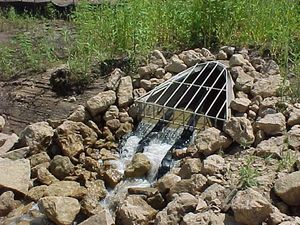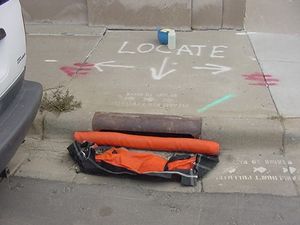
Difference between revisions of "Sediment control practices"
m |
m |
||
| Line 18: | Line 18: | ||
*[[Sediment control practices - Storm drain inlet protection]] | *[[Sediment control practices - Storm drain inlet protection]] | ||
*[[Sediment control practices - Outlet energy dissipation]] | *[[Sediment control practices - Outlet energy dissipation]] | ||
| − | *[[Sediment control practices - Sediment traps and basins]] | + | *[[Sediment control practices - Sediment traps and basins]] - '''NEW''' |
| − | *[[Sediment control practices - Stabilized earth/soil berm]] | + | *[[Sediment control practices - Stabilized earth/soil berm]] - '''NEW''' |
| − | *[[Sediment control practices - Buffer zones]] | + | *[[Sediment control practices - Buffer zones]] - '''NEW''' |
| − | *[[Construction stormwater treatment - dewatering, including chemical treatment and sediment filtration]] | + | *[[Construction stormwater treatment - dewatering, including chemical treatment and sediment filtration]] - '''NEW''' |
*[[Construction stormwater best management practice – buffer zones]] - Note this is a short fact sheet on the topic. For detailed information, see [[Sediment control practices - Buffer zones]] | *[[Construction stormwater best management practice – buffer zones]] - Note this is a short fact sheet on the topic. For detailed information, see [[Sediment control practices - Buffer zones]] | ||
Revision as of 18:57, 17 April 2019
Erosion is the process by which soil, rock, or other material is moved from one location to another, typically through the action of water or wind. Sediment control practices are designed to prevent or minimize loss of eroded soil at a site. Typical sediment control practices focus on the following.
- Physical filtration of sediment by trapping soil particles as water passes through a silt fence, drop inlet screen, fiber roll, etc.
- Settling processes, that allow sediment to fall out of flows that are slowed and temporarily impounded in ponds, traps, or in small pools created by berms, silt fencing, inlet protection dikes, check dams, and so on
This page provides links to several pages in this manual that address sediment control at construction stormwater sites, as well as links to other pages and information related to erosion prevention practices.
Sediment control practices
- Sediment control practices - Vehicle tracking BMPs
- Sediment control practices - Perimeter controls for disturbed areas
- Sediment control practices - Check dams (ditch checks, ditch dikes)
- Sediment control practices - Diversion barrier controls (cofferdams/temporary dikes)
- Sediment control practices - Storm drain inlet protection
- Sediment control practices - Outlet energy dissipation
- Sediment control practices - Sediment traps and basins - NEW
- Sediment control practices - Stabilized earth/soil berm - NEW
- Sediment control practices - Buffer zones - NEW
- Construction stormwater treatment - dewatering, including chemical treatment and sediment filtration - NEW
- Construction stormwater best management practice – buffer zones - Note this is a short fact sheet on the topic. For detailed information, see Sediment control practices - Buffer zones
Photo galleries
- Stabilization practices
- Perimeter control
- Vehicle tracking BMPs
- Outlet energy dissipation
- Check dams (ditch checks, ditch dikes)
- Storm drain inlet protection
Links
- Main construction stormwater page
- Erosion prevention practices
- General principles for erosion prevention and sediment control at construction sites in Minnesota
- Construction stormwater best management practice – perimeter control fact sheet
- Construction Stormwater Inspection Checklist
- Linear permanent stormwater management design flow chart
- Construction stormwater best management practice – Concrete, paint, stucco and other washout guidance
- EPA Concrete Washout Stormwater Best Management Practice
- Construction stormwater best management practice – buffer zones
- Construction stormwater best management practice – Site stabilization
- Construction stormwater – Top 5 permit violations
Permit applicability
Warning: The Construction Stormwater General permit states "The Permittee(s) must stabilize all exposed soil areas (including stockpiles)." For more specific information, see Part IV.B.2 of the permit.

